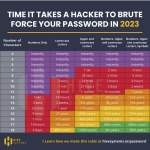My account was hacked yesterday. I learned about it by getting a PM from somebody asking how to pay for an item that I was selling. I've never listed anything for sale on VAF. I immediately made a post on the thread that had the scam listing warning folks that my account was hacked and this was a scam but the guy that hacked my account deleted my posts. I tried to change my password but by then he had already changed it so I was no longer able to post. I sent a message to the mods during this time telling them what happened but didn't hear back. Probably because I was actually no longer logged in.
I ended up sending an email to Doug (forum owner) and he called me this morning to verify I am who I say I am. Doug was super nice and apologized for the hassle but it was my fault. My account has now been restored.
This is what I learned:
Don't use a simple password for ANY accounts!
I've always used very secure passwords for my financial accounts but didn't bother for things like forums. I belong to more than 100 forums and use a six or eight digit password for them. I don't have a criminal mind so I thought a simpler password was sufficient for forums when all we do is share our thoughts. I had no idea somebody would take my identity and try to sell things under my userid.
Like many of you, it's a MAJOR hassle keeping track of hundreds of passwords so I tried to keep it simple for "low risk" accounts like forums, etc. Not any more. I will spend the rest of the day today changing passwords across all my accounts. I've told my wife many times over the years that I hope I live long enough to see the day when passwords are no longer needed. Hey, I can dream...
My apologies to the folks who replied to "my" posts yesterday for items that the hacker tried to sell using my account. I tried hard to stop the sale but was not able to. Learn from my ignorance. Use a complex password even for simple accounts that appear to pose no risk to you.
I ended up sending an email to Doug (forum owner) and he called me this morning to verify I am who I say I am. Doug was super nice and apologized for the hassle but it was my fault. My account has now been restored.
This is what I learned:
Don't use a simple password for ANY accounts!
I've always used very secure passwords for my financial accounts but didn't bother for things like forums. I belong to more than 100 forums and use a six or eight digit password for them. I don't have a criminal mind so I thought a simpler password was sufficient for forums when all we do is share our thoughts. I had no idea somebody would take my identity and try to sell things under my userid.
Like many of you, it's a MAJOR hassle keeping track of hundreds of passwords so I tried to keep it simple for "low risk" accounts like forums, etc. Not any more. I will spend the rest of the day today changing passwords across all my accounts. I've told my wife many times over the years that I hope I live long enough to see the day when passwords are no longer needed. Hey, I can dream...
My apologies to the folks who replied to "my" posts yesterday for items that the hacker tried to sell using my account. I tried hard to stop the sale but was not able to. Learn from my ignorance. Use a complex password even for simple accounts that appear to pose no risk to you.






